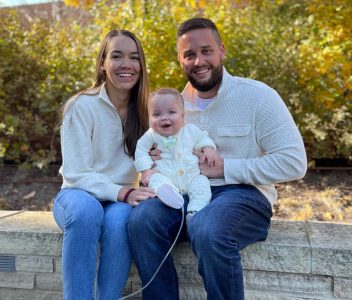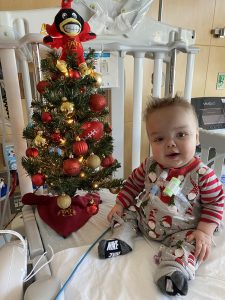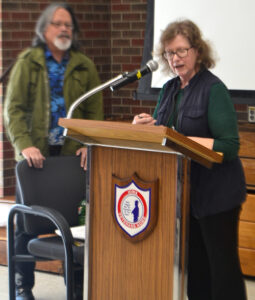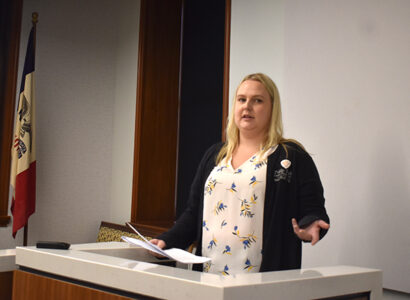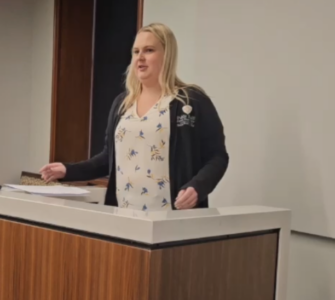‘Kinnick Wave’ connects child with kidney donor
No mother is prepared for bad news regarding her pregnancy, and Marshalltown native Mady (Van Metre) Schmidt was no different.
After some back and forth trips to different areas of Iowa, she and her husband Andrew had settled on building a home in Ankeny as they prepared for a new addition to their family. Her pregnancy had been developing normally.
The couple was excited to welcome baby Cooper into the world, but at her 32-week ultrasound, some complications became apparent. Doctors discovered there was no amniotic fluid protecting Cooper, and his kidneys were unusually large.
“That was something that was completely unexpected,” Schmidt said. “Within a whirlwind week, we had gone to specialists in Des Moines and then been referred to specialists in Iowa City.”
After several appointments, it was determined Cooper more than likely suffered from Polycystic Kidney disease, which is characterized by groups of cysts that form in the kidneys, causing them to increase in size and lose function. Schmidt’s doctors were initially unsure of the severity, and they had their doubts Cooper would even make it to delivery let alone survive after that.
“There were a lot of questions and a lot of fear in the next eight weeks that were to come,” Schmidt said.
In order to ensure that Cooper would receive the level of care that he would need, they scheduled an induction at the University of Iowa Stead Family Children’s Hospital because of its state-of-the-art Neonatal Intensive Care Unit (NICU). When the day came, Cooper survived delivery, but he was not breathing because his lungs were underdeveloped as a result of the kidney disease.
The NICU team went to work immediately with no time to waste. In the first moments of Cooper’s life, he needed a lot of medical aid to survive. He was resuscitated, chest tubes were inserted and he was placed on an oscillator. Through the hard work of the NICU team, Cooper made it through his first day.
“I’ve found that there are other children with his disease that didn’t make it past that first day. It’s a very severe condition, so we’re grateful he was able to make it past that point,” Schmidt said.
On his second day of life, Cooper had his first surgery to insert a dialysis catheter, so peritoneal dialysis could start. At that point, his kidneys were so full of cysts they could not function. At just two days old, a long road of daily dialysis treatments began, and he was also intubated at that time so he could breathe properly.
The next four months were a blur of additional treatments and surgeries. After multiple failed attempts to get Cooper off of the breathing tube, doctors opted to perform a tracheostomy, a medical procedure that creates a hole in the front of the neck and windpipe. From there, a tracheostomy tube is inserted into that hole to keep it open for breathing. This did wonders for Cooper’s wellbeing, and his mother said it has worked out great for him.
At seven months, the Schmidts had to make the extremely difficult decision to have both of Cooper’s kidneys removed after they had become so large they were not allowing his lungs to fully expand.
They were also causing him a great deal of discomfort, leaving them with little choice. From that point on, Cooper became 100 percent reliant on dialysis, and the search for a kidney donor commenced.
Schmidt took to social media, specifically TikTok, to share her family’s story and to raise awareness of Cooper’s need for a kidney. Her posts were popular, but none did as well as the video from the now-famous wave at Kinnick Stadium in Iowa City, a tradition that involves fans waving to the children at the hospital behind the stadium after the first quarter of University of Iowa football home games.
Schmidt took the opportunity at a recent game to show what it looked like from the hospital and to show the children who the fans were actually waving at during the games. It went viral and racked up over 4 million views.
“It blew up. Even the NFL ended up commenting on it, so I think that helped gain more attention for Cooper’s page, and then we just continued to share more and more,” Schmidt said.
About a week and a half ago, the family received the amazing news: a donor had been secured for Cooper. The donor saw some of his videos and reached out to the UI Children’s Hospital hoping they could be a match for Cooper, and after some tests, it was determined the kidney was a match. The transplant is scheduled for Jan. 6, 2022, and the family hopes that after a long year, if everything is successful, they will be able to take Cooper home for the first time ever in March.
The Schmidts had recently built a home in Ankeny before Cooper was born, and they were only able to live in it for two weeks before having to move to Iowa City, first to a hotel and then to an apartment. They look forward to heading home as soon as they can.
“I have his nursery all decorated, and everything is ready. We are just eagerly waiting to bring our whole family together in our home,” Schmidt said.
Cooper celebrated his first birthday just last week on Dec. 9.
Schmidt lived in Marshalltown through her sophomore year of high school and still considers it home because it’s where her parents live and work. She returned to graduate from Marshalltown Community College, playing basketball and volleyball on the college teams before eventually coaching both of them.
——
Contact Susanna Meyer at 641-753-6611 or
smeyer@timesrepublican.com.
- CONTRIBUTED PHOTOS — Left to right, Mady Schmidt, Cooper Schmidt and Andrew Schmidt. For the last year, Cooper has battled polycystic kidney disease, but a kidney donor has recently been found. His transplant is scheduled for Jan. 6.
- Cooper enjoys the great outdoors outside of the University of Iowa Stead Family Children’s Hospital.
- Cooper posed next to a Christmas tree adorned with Iowa State decorations.

